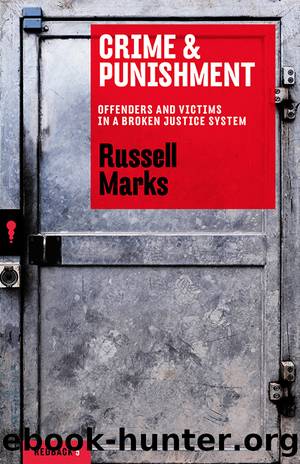Crime Punishment by Russell Marks

Author:Russell Marks [Marks, Russell]
Language: eng
Format: epub
Tags: Politics
ISBN: 9781863957175
Barnesnoble:
Goodreads: 23845706
Publisher: Black Inc.
Published: 2015-02-25T00:00:00+00:00
CHAPTER 4
VICTIMS
I can hear the criticism of my arguments at this point. âWhat about the victims? Youâve expressed a lot of sympathy for criminals, but shouldnât most of your sympathy â and, indeed, your empathy â be reserved for the people they have harmed?â
Itâs a point thatâs often raised with criminal defence lawyers, who imagine theyâre in the human rights protection game until someone whoâs not a defence lawyer reminds them of the prevailing community attitude. But people tell me all the time: âYouâre defending bad people and trying to get them off!â
Thereâs truth to this, of course, and itâs a truth all would-be reformers of the criminal justice system must tackle. What Iâm going to advance in this chapter is the idea that we should focus on the needs of victims much more than we do â and that doing so doesnât mean we canât also focus more on offendersâ needs. Or, more accurately, on what society needs to prevent offenders from committing crimes.
To be a victim of a crime is a terrible thing. Iâve never been physically assaulted as an adult, and for that Iâm grateful. But I have been a victim of crime. The night we moved into our current flat, some things were stolen from our car. Exhausted after a day of moving, Iâd inadvertently left the car unlocked and returned the next morning to find that a piggybank full of silver coins, some CDs and my partnerâs backpack containing her uni notes, her prescription glasses and her passport were missing. We retrieved the backpack and most of the notes after receiving a call from someone who had found my partnerâs phone number in her diary; he said the bag had been dumped on the footpath outside the school where he worked as a groundskeeper. But the glasses and the passport were gone. Altogether, the theft cost us about $700, which was significant to us, as well as the time it took to organise replacements.
I use the word âvictimâ in a technical sense only: objectively, leaving a car door unlocked and suffering a minor theft is unlikely to earn me much sympathy (and it didnât from my partner). But more significant than the financial cost, at least initially, were the feelings of mistrust. Where had we moved to? Had we made a big mistake? The carpark was secure, in the sense that you needed a key to get in. We thought the thief had to be one of our neighbours or someone known to them. Would it happen again? The mind slides quickly to paranoia. Were we being targeted, perhaps as unwanted newcomers in an apartment-block conspiracy? Why us?
When we learned how notoriously prone to theft âsecureâ underground carparks are, that rational observation did not immediately displace our emotional responses. It took some days for us to convince ourselves that we hadnât just moved into the least safe building in Australia.
The crime wasnât even that bad. The house in which I grew up was burgled once, when I was a child, the thieves making off with a couch and a bed among other things.
Download
This site does not store any files on its server. We only index and link to content provided by other sites. Please contact the content providers to delete copyright contents if any and email us, we'll remove relevant links or contents immediately.
| African | Asian |
| Australian & Oceanian | Canadian |
| Caribbean & Latin American | European |
| Jewish | Middle Eastern |
| Russian | United States |
4 3 2 1: A Novel by Paul Auster(12363)
The handmaid's tale by Margaret Atwood(7750)
Giovanni's Room by James Baldwin(7316)
Asking the Right Questions: A Guide to Critical Thinking by M. Neil Browne & Stuart M. Keeley(5751)
Big Magic: Creative Living Beyond Fear by Elizabeth Gilbert(5749)
Ego Is the Enemy by Ryan Holiday(5412)
The Body: A Guide for Occupants by Bill Bryson(5075)
On Writing A Memoir of the Craft by Stephen King(4925)
Ken Follett - World without end by Ken Follett(4719)
Adulting by Kelly Williams Brown(4564)
Bluets by Maggie Nelson(4542)
Eat That Frog! by Brian Tracy(4518)
Guilty Pleasures by Laurell K Hamilton(4437)
The Poetry of Pablo Neruda by Pablo Neruda(4090)
Alive: The Story of the Andes Survivors by Piers Paul Read(4017)
White Noise - A Novel by Don DeLillo(3999)
Fingerprints of the Gods by Graham Hancock(3985)
The Book of Joy by Dalai Lama(3968)
The Bookshop by Penelope Fitzgerald(3843)
